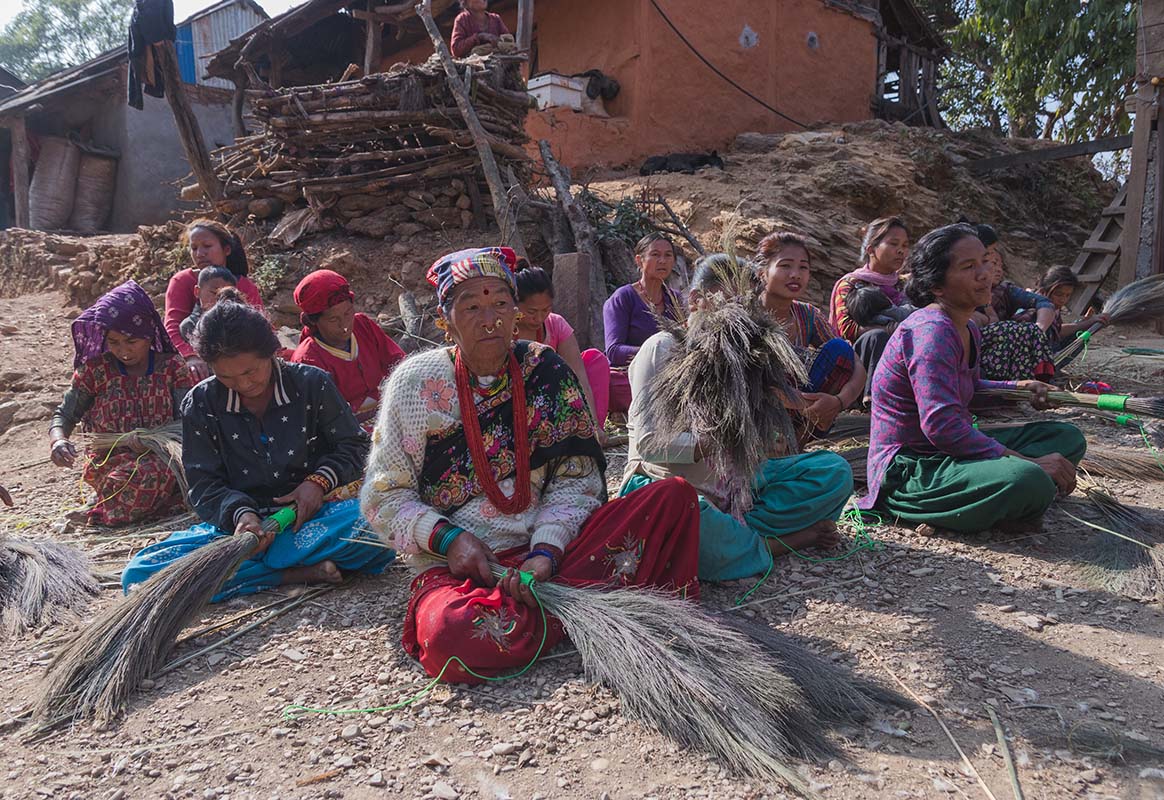Bio-engineering Social Enterprise for Disaster Risk Reduction and Livelihood Upliftment

Bio-engineering Social Enterprise for Disaster Risk Reduction and Livelihood Upliftment
Introduction
The Bioengineering Social Enterprise for Disaster Risk Reduction and Livelihood Upliftment is a nature-based initiative designed to mitigate the impacts of climate-induced disasters, prevent human and environmental loss, and promote sustainable livelihoods. The project focuses on working with indigenous and marginalized communities living in landslide-prone and ecologically fragile regions of Nepal, including Raksirang Rural Municipality (Makwanpur), Mahakulung Rural Municipality (Solukhumbu), Dhangadimai Municipality (Siraha), and Kalika Municipality (Chitwan).
By encouraging the plantation of broom grass and other bio-engineering crops on degraded and vulnerable lands, the project stabilizes slopes, reduces disaster risks, and generates sustainable income. Beneficiaries receive training on product making (such as brooms and organic paper from agro-waste) and are connected to markets to ensure fair earnings. This approach not only helps protect the environment but also uplifts the economic conditions of indigenous and marginalized groups focusing women and youths and also fostering community leadership, climate resilience, and long-term sustainability.
The project was implemented in following locations:
1610
Raksirang Rural Municipality, Makwanpur
1.Phase 1: Pilot Implementation
This pilot phase tested the viability of broom grass plantation in both the most accessible (Ward 5) and the most remote (Ward 7) areas. Local user committees (10–15 members) were formed to manage, monitor, and lead the activities. The initiative revived traditional practices of broom grass planting for landslide prevention and income generation.
Location: Wards 5 & 7, Raksirang Rural Municipality, Makwanpur
Community Context: The project engaged the Chepang community, an indigenous group facing high poverty, landlessness, and food insecurity. Though traditionally familiar with broom grass, they had abandoned its use due to poor market access. The project revived this practice as a nature-based solution for both disaster risk reduction and livelihood upliftment.
Impact:
- 510 Chepang households engaged
- 300,000+ broom grass saplings planted
- 410 landslide-prone areas and 100 barren lands covered
- Broom-making training for female members
- 300,000+ brooms produced
1100
Raksirang Rural Municipality, Makwanpur
Following the success of the pilot phase, the project was expanded to all nine wards of Raksirang Rural Municipality. Building on the lessons and community structures established in Phase I, this phase aimed to stabilize more landslide-prone areas, increase broom production, and introduce new livelihood options like organic paper making from agro-waste.
Location: All 9 wards, Raksirang Rural Municipality, Makwanpur
Community Context: The Chepang community remained the primary focus in this phase. As one of Nepal’s most marginalized groups, they face limited access to education, healthcare, and land ownership. The scale-up allowed more Chepang households to benefit from slope stabilization and sustainable income opportunities through bioengineering practices.
Impact:
- 1,100 households reached
- 600,000+ saplings planted
- 764 landslide-prone areas and 323 barren lands stabilized
- Organic paper production from agro-waste introduced
- 400,000+ brooms produced
1000+
Mahakulung Rural Municipality, Dhangadimai Municipality, Kalika Municipality
This phase focused on replicating the success of Raksirang in three new climate-vulnerable and ecologically fragile regions. Building on five years of experience, the project introduced broom grass plantation and sustainable livelihood training in communities facing similar environmental and socio-economic challenges.
Locations:
- Mahakulung Rural Municipality, Solukhumbu
- Dhangadimai Municipality, Siraha
- Kalika Municipality, Chitwan
Community Context:
- In Mahakulung, the project worked with Kulung Rai, Sherpa, Chhetri, and Dalit groups reliant on forests and agriculture, vulnerable to landslides, and increasingly interested in eco-based solutions.
- In Dhangadimai, the focus was on Sadaya (Musahar), Dalits, and landless households in flood-prone, degraded areas with minimal livelihood options.
- In Kalika, the Chepang community—facing poverty, drought, and food insecurity—was supported through slope stabilization and income generation from broom-based enterprises.

